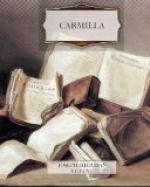How they escape from their graves and return to them for certain hours every day, without displacing the clay or leaving any trace of disturbance in the state of the coffin or the cerements, has always been admitted to be utterly inexplicable. The amphibious existence of the vampire is sustained by daily renewed slumber in the grave. Its horrible lust for living blood supplies the vigor of its waking existence. The vampire is prone to be fascinated with an engrossing vehemence, resembling the passion of love, by particular persons. In pursuit of these it will exercise inexhaustible patience and stratagem, for access to a particular object may be obstructed in a hundred ways. It will never desist until it has satiated its passion, and drained the very life of its coveted victim. But it will, in these cases, husband and protract its murderous enjoyment with the refinement of an epicure, and heighten it by the gradual approaches of an artful courtship. In these cases it seems to yearn for something like sympathy and consent. In ordinary ones it goes direct to its object, overpowers with violence, and strangles and exhausts often at a single feast.
The vampire is, apparently, subject, in certain situations, to special conditions. In the particular instance of which I have given you a relation, Mircalla seemed to be limited to a name which, if not her real one, should at least reproduce, without the omission or addition of a single letter, those, as we say, anagrammatically, which compose it.
Carmilla did this; so did Millarca.
My father related to the Baron Vordenburg, who remained with us for two or three weeks after the expulsion of Carmilla, the story about the Moravian nobleman and the vampire at Karnstein churchyard, and then he asked the Baron how he had discovered the exact position of the long-concealed tomb of the Countess Mircalla? The Baron’s grotesque features puckered up into a mysterious smile; he looked down, still smiling on his worn spectacle case and fumbled with it. Then looking up, he said:
“I have many journals, and other papers, written by that remarkable man; the most curious among them is one treating of the visit of which you speak, to Karnstein. The tradition, of course, discolors and distorts a little. He might have been termed a Moravian nobleman, for he had changed his abode to that territory, and was, beside, a noble. But he was, in truth, a native of Upper Styria. It is enough to say that in very early youth he had been a passionate and favored lover of the beautiful Mircalla, Countess Karnstein. Her early death plunged him into inconsolable grief. It is the nature of vampires to increase and multiply, but according to an ascertained and ghostly law.




